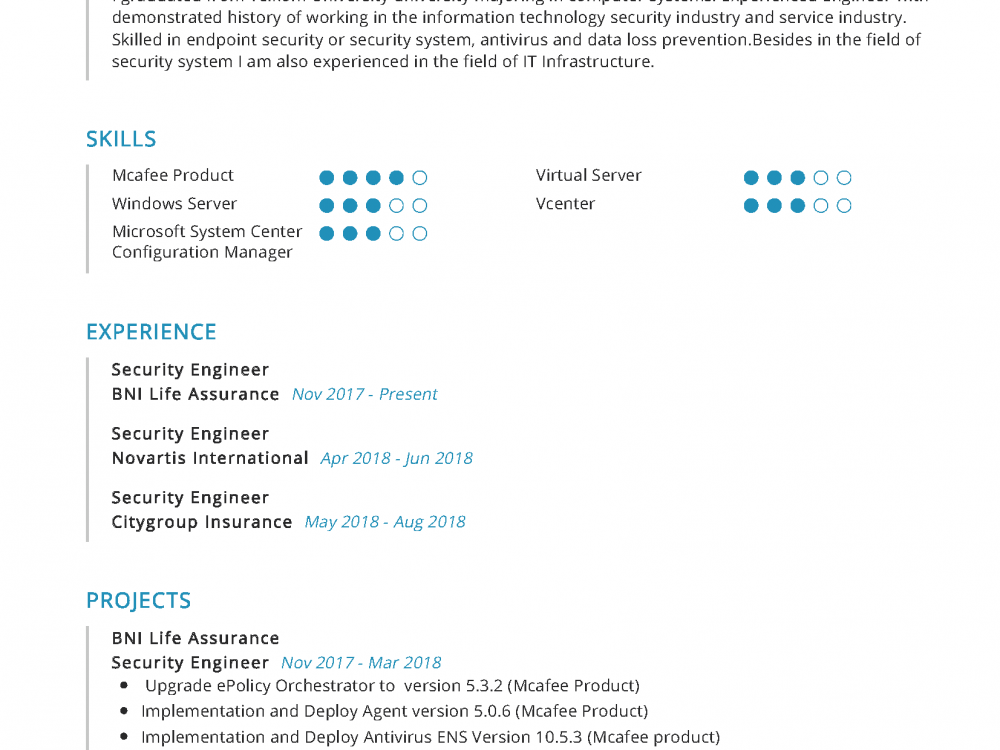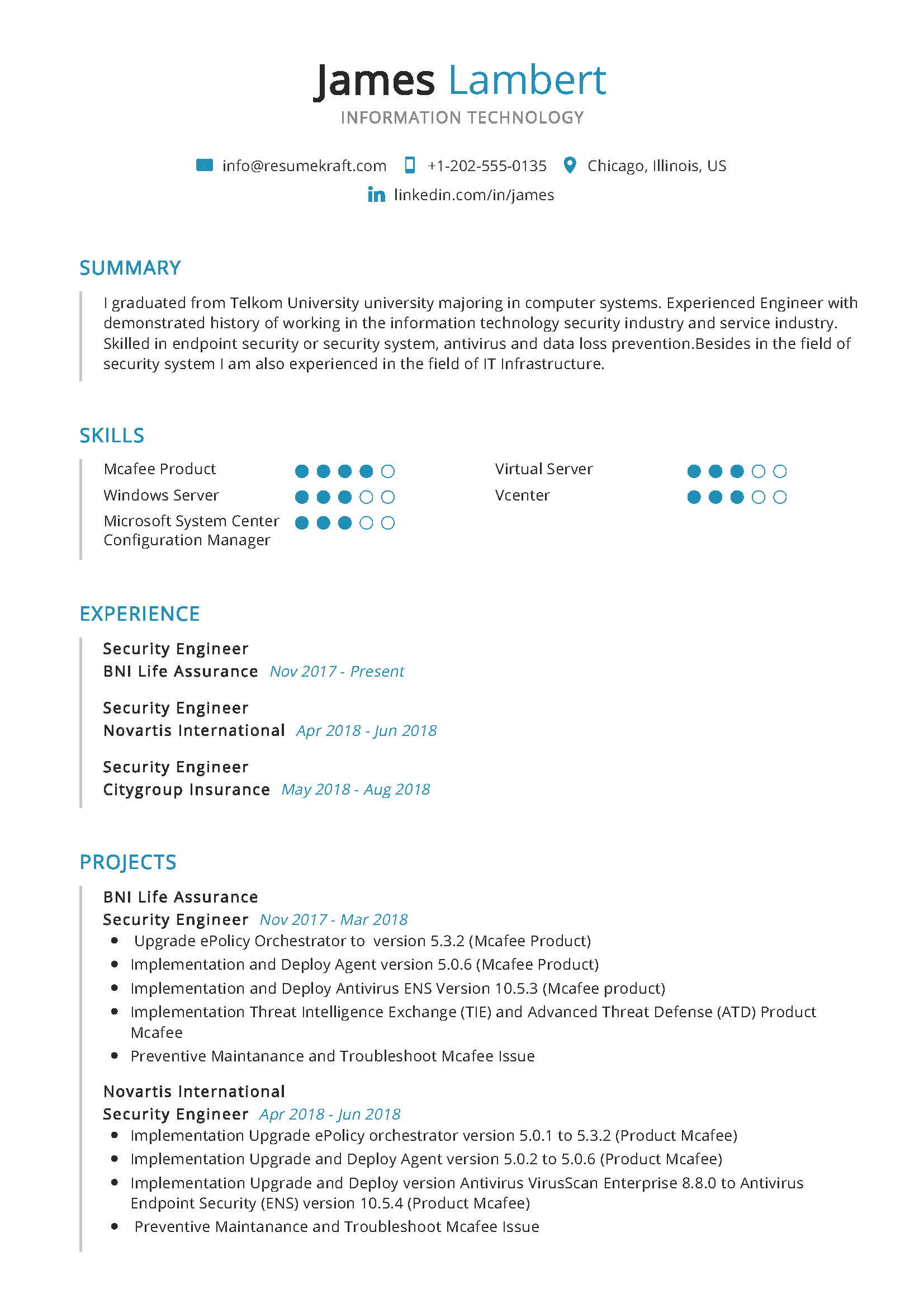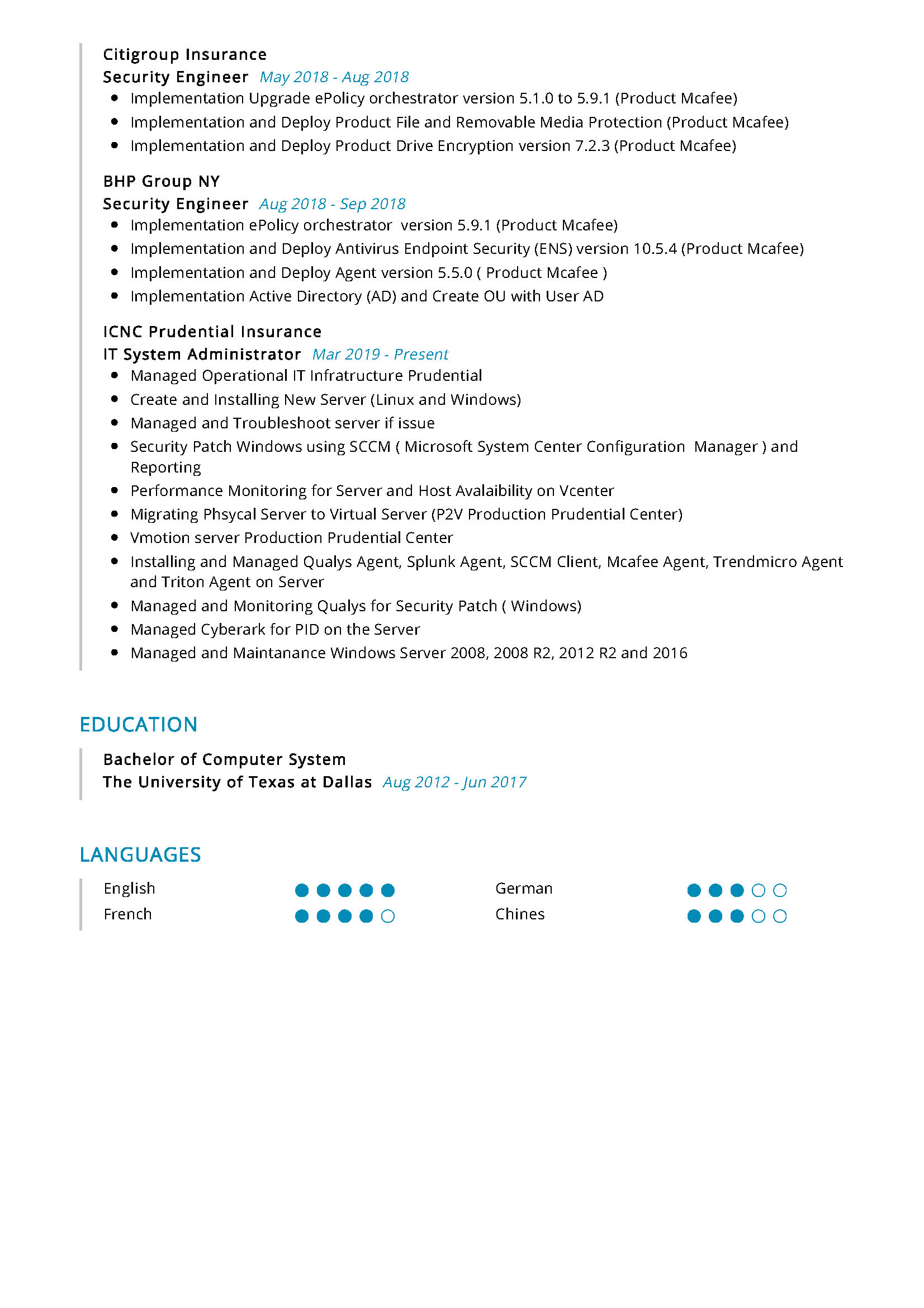Are you a software developer by profession and looking for an exciting career? We have good news for you! use our professional Information Technology Resume Sample. You don’t have to start writing from scratch. Just click “Edit Resume” and modify it with your details. Update the template fonts and colors have the best chance of landing your dream job. Find more resume samples.
Information Technology Resume Sample
James Lambert
Information Technology
Summary
I graduated from Telkom University university majoring in computer systems. Experienced Engineer with a demonstrated history of working in the information technology security industry and service industry. Skilled in endpoint security or security system, antivirus, and data loss prevention. Besides in the field of security system, I am also experienced in the field of IT Infrastructure.
Skills
Experience
Security Engineer – Nov 2018 – Present
BNI Life Assurance
Security Engineer –Apr 2017 – Nov 2018
Novartis International
Security Engineer – Aug 2015 – Apr 2017
Citigroup Insurance
Education
Bachelor of Computer System
The University of Texas at Dallas
Projects
BNI Life Assurance
Security Engineer
- Upgrade ePolicy Orchestrator to version 5.3.2 (Mcafee Product)
- Implementation and Deploy Agent version 5.0.6 (Mcafee Product)
- Implementation and Deploy Antivirus ENS Version 10.5.3 (Mcafee product)
- Implementation Threat Intelligence Exchange (TIE) and Advanced Threat Defense (ATD) Product Mcafee
- Preventive Maintenance and Troubleshoot Mcafee Issue
Novartis International
Security Engineer
- Implementation Upgrade ePolicy orchestrator version 5.0.1 to 5.3.2 (Product Mcafee)
- Implementation Upgrade and Deploy Agent version 5.0.2 to 5.0.6 (Product Mcafee)
- Implementation Upgrade and Deploy version Antivirus VirusScan Enterprise 8.8.0 to Antivirus Endpoint Security (ENS) version 10.5.4 (Product Mcafee)
- Preventive Maintenance and Troubleshoot Mcafee Issue
Citigroup Insurance
Security Engineer
- Implementation Upgrade ePolicy orchestrator version 5.1.0 to 5.9.1 (Product Mcafee)
- Implementation and Deploy Product File and Removable Media Protection (Product Mcafee)
- Implementation and Deploy Product Drive Encryption version 7.2.3 (Product Mcafee)
BHP Group NY
Security Engineer
- Implementation ePolicy orchestrator version 5.9.1 (Product Mcafee)
- Implementation and Deploy Antivirus Endpoint Security (ENS) version 10.5.4 (Product Mcafee)
- Implementation and Deploy Agent version 5.5.0 ( Product Mcafee )
- Implementation Active Directory (AD) and Create OU with User AD
ICNC Prudential Insurance
IT System Administrator
- Managed Operational IT Infrastructure Prudential
- Create and Installing New Server (Linux and Windows)
- Managed and Troubleshoot server if issue
- Security Patch Windows using SCCM ( Microsoft System Center Configuration Manager ) and Reporting
- Performance Monitoring for Server and Host Avalaibility on Vcenter
- Migrating Physical Server to Virtual Server (P2V Production Prudential Center)
- Vmotion server Production Prudential Center
- Installing and Managed Qualys Agent, Splunk Agent, SCCM Client, Mcafee Agent, Trendmicro Agent and Triton Agent on Server
- Managed and Monitoring Qualys for Security Patch ( Windows)
- Managed Cyberark for PID on the Server
- Managed and Maintenance Windows Server 2008, 2008 R2, 2012 R2 and 2016
Languages
- French
- English
- German
- Chines
Career Expert Tips:
- Always make sure you choose the perfect resume format to suit your professional experience.
- Ensure that you know how to write a resume in a way that highlights your competencies.
- Check the expert curated popular good CV and resume examples
Information Technology Resume with Writing Guide
When you decide to apply for a job in Information Technology, your resume becomes one of your most important weapons. It’s the first impression the employer will see, and it’s what they’ll use to determine whether you’re worth their time reading through your application and interviewing you. A well-written resume is imperative for getting through the door of opportunity.
A good place to begin is by customizing your resume according to a company’s job description. Make sure you research the job you’re applying for and tailor your resume towards that position.
The next thing to focus on is your credentials. The most important things an employer will look for are your relevant skills and experience. Show that you have the qualifications necessary by highlighting your accomplishments in previous positions. By relating how these skills apply to the position you’re applying for, it will allow the employer to see that you’re qualified for their needs.
Information Technology Resume Writing Guide:
- Your resume must be professional.
- If you have a specific job you are applying for, use the company’s job description to create an appropriate resume for that company.
- Demonstrate relevant skills and experience in previous positions by highlighting your intellectual curiosity, character, and creativity. Make sure to focus on your accomplishments in previous positions that have relevance to the job you are applying for so the employer will see that you are qualified for their needs.
- Don’t be afraid to tailor your resume to the job you are applying for. Use a font and font size that are appropriate for the company you are applying to. This may include their brand and style of communication.
- Be sure to write in the third person when possible, so your employer will see you as more than just an applicant with an agenda.
- Use headers liberally throughout your resume, especially at the beginning of each section, so they can see exactly what skills and experience you have.
- Your resume should be no longer than two pages, and no shorter than one.
- Ensure that you are well-versed in all aspects of IT that are relevant to the job you are applying for, including hardware and software systems. Consider keeping a file on your computer to keep notes about the things you learn on a daily basis.
- When you are applying for a technical position, ensure that your resume is formatted professionally and that it’s easy for an employer to read.
- It is important that you tailor your resume to the specific job you are applying for, keep it consistent throughout all jobs you apply to, and present yourself as a professional who is qualified for the position being applied for. 11. Ensure that your resume has a title page at the top of the first page with your full name, address, email address, and phone number on it.
Top 10 Information Technology Skills:
- Software Development: The ability to create original computer programs, as well as documenting and maintaining them, is essential. Basic Programming.
- Software Testing: Ensuring that software switches to the correct operating mode under all conditions during development is important. Writing and running test cases, following software standards and procedures, and performing quality assurance on new or modified software are also responsibilities of a software tester.
- Technical Support: Providing technical support for computer systems is another area of Information Technology. An important skill is the ability to troubleshoot problems, explain software and system operations, and resolve hardware problems.
- Information Systems Security: Helping to prevent information from being compromised is another responsibility of Information Technology professionals. So is ensuring that systems are secured against unauthorized access, including by making sure data is encrypted before transmission.
- Database Design: Creating databases with unique characteristics for use in specific applications is common in Information Technology jobs.
- Web Design and Development: Ensuring that functionality, content, and appearance are appealing to users is important. Carefully thinking about how a site will look on different browsers is also critical.
- Networking: Understanding the principles behind networks and configuring computers to communicate over a network are helpful skills in this area.
- Software Quality Assurance: Testing software to ensure that it fulfills the needs of users is another crucial skill in Information Technology jobs.
- Security Administration: Assessing security risks and implementing controls to ensure that information is protected against unauthorized access and loss is a critical skill in many Information Technology jobs.
Top 10 Informatics Skills:
- Research Methodology: Understanding the processes for conducting research so that it can be presented with brevity, clarity, and organization is important. Controlling for biases in the research process are also important skills.
- Statistics: Analyzing data to understand trends and patterns is another important area of research methodology in informatics.
- Databases: Creating and maintaining databases that contain the information used in a research study is one of the important tasks of informatics.
- Information Design: One of the most important functions of an informatics job is to make sure that information is presented in an attractive and effective manner so that researchers can understand it easily.
- Information Systems Analysis: Identifying trends and patterns in data is another important part of researching informatics.
- Collaboration: Understanding that a group effort is required to form a successful research study is important information for informatics workers.
- Statistic Analysis: Processes for conducting statistical analyses and presenting the results of the analyses are critical skills in informatics jobs.
- Information Management: Enhancing information by adding metadata, organizing it, and providing access to it are part of the important functions of an informatics job.
- Information Technology Management: Managing information technology resources and their use is another important skill in informatics.
- Database Management: Creating and maintaining databases in an organization is another common function of informatics workers.
It is important to note that these skills are not exclusive to the field of Informatics but rather are present in the majority of jobs that require Information Technology professionals.
Informatics Resume Objective:
Informatics resumes should be focused on the job seeker’s relevant skills and experience. The objective is to emphasize your related skills and experience that directly relate to the job that you are applying for.
Tips:
- Use action verbs, which show what you did and how well you did it.
- Use results-oriented verbs to demonstrate your accomplishments.
- Employ quantified statements to show your skills and the scope of their impact.
- Create a summary statement that emphasizes transferable skills and abilities that are relevant to the job you are applying for. If more than one will apply, prioritize them in order of importance or relevance to the job you are applying for.
- Use short, powerful sentences to show that you are talented and capable of contributing to the employer’s success.
Informatics Cover Letter:
Informatics cover letters are specifically tailored to the job that you are applying for. But, you can take a few steps to make sure it stands out and attracts attention.
Tips:
- Choose the right format. Use a straightforward linear format for an application letter that is being sent to a potential employer in response to a job posting or advertisement, and use a combination of linear, functional, and combination formats for tailored cover letters that are used when responding to unsolicited invitations or requests from contact persons who are already aware of your skills and experience and have expressed interest in meeting you.
- Use specific examples with detail—the more specific you can be about your accomplishments, the better.
- No matter who is reviewing it, make sure your cover letter is not just another resume or an extension of your resume. It should be a short (one or two pages) document that highlights your skills and qualifications for the job you are applying for.
- Use the cover letter to lay out the reasons why you are interested in this particular job and company.
- Make sure that your cover letter mentions key points about your previous experience that relate directly to the job you are applying for.
- Use short, powerful sentences to demonstrate your talent, skills and abilities that are relevant to the job you are applying for.
- Use action verbs, which show what you did and how well you did it.
- Employ quantified statements to show your skills and the scope of their impact.
- Use short, powerful sentences to show that you are talented and capable of contributing to the employer’s success.
Key Takeaways:
- Research the company you are applying to, and find out where it is headed.
- Find out about the job you are applying to, and know your own qualifications.
- Think of the job as an opportunity for you: what will it offer you? What opportunities will it give you?
- Come prepared with a well thought out answer for each question that is asked during an interview.
- Be open and ready to talk about why you want to work at this company and why they should hire you.



